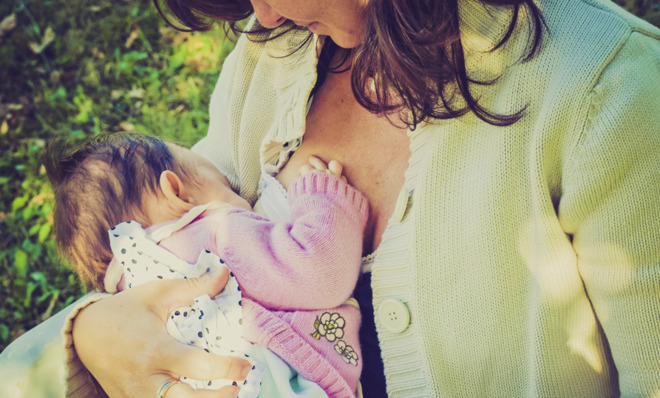Should we pay women to breastfeed?
The latest skirmish in the Mommy Wars is unfolding in the U.K.

A free daily email with the biggest news stories of the day – and the best features from TheWeek.com
You are now subscribed
Your newsletter sign-up was successful
If you needed any proof that the Mommy Wars aren't restricted to the United States, a new controversy over breastfeeding on the other side of the pond shows how polarizing every aspect of motherhood has become.
The British government, in conjunction with Sheffield University, has launched a pilot program to pay women to breastfeed. Mothers will receive £120 in coupons (a little over $190) if they breastfeed for the first six weeks of their children's lives, and another £80 (about $130) if they continue until their babies are six months old.
The U.K. has made breastfeeding a major public health issue in a way the U.S. has not. Thirty-four percent of British women breastfeed their babies for the first six months of life, which is what's recommended by the government. That's higher than in the U.S. (29 percent), but 2013 saw the U.K.'s first decrease in breastfeeding in a decade of collecting data. From 1993 until 2012, the country even had a National Breastfeeding Awareness Week to promote the practice, which had formerly been considered unhealthy or shameful in some circles.
The Week
Escape your echo chamber. Get the facts behind the news, plus analysis from multiple perspectives.

Sign up for The Week's Free Newsletters
From our morning news briefing to a weekly Good News Newsletter, get the best of The Week delivered directly to your inbox.
From our morning news briefing to a weekly Good News Newsletter, get the best of The Week delivered directly to your inbox.
Paying women is "a way of acknowledging both the value of breastfeeding to babies, mothers, and society," Dr. Clare Relton, the expert leading the project, tells the BBC. Indeed, the health benefits of breastfeeding through the first six months of life are so great that demand for breast milk in the U.S. has spilled over into internet retail sites.
It's certainly an unconventional strategy. But why is it controversial?
Many argue that the government is patronizing poorer women because the program specifically targets underprivileged areas. "The scheme is being tried out among 'disadvantaged' women on low incomes," writes Joanna Moorhead at The Guardian. "The thinking seems to be that these are the people who can be told what to do."
It is important to note that lower-income women are four times less likely to breastfeed, so there is statistical evidence that these women are most in need of breastfeeding programs.
A free daily email with the biggest news stories of the day – and the best features from TheWeek.com
That being said, in the United States we know that the definition of a "good" parent is often determined by more privileged women who have the means to stay at home and breastfeed. For some mothers, breastfeeding is a luxury. No wonder, writes Grace Dent at The Independent, that "breastfeeding seems like the tedious one-note hobbyhorse of a small vocal group of women who gave up jobs to be mummies and are now...at home with laptops disseminating guilt and shame."
Anushka Asthana at Sky News went so far as to say the government's program was "demeaning," adding, "The people who came up with this pilot scheme have fundamentally failed to understand the pressure and difficulties that many new mothers are under with regards to feeding their babies."
However, this strong wave of criticism seems a little excessive for a program that at its core is undeniably well-intentioned. The degree of anger it has aroused only reveals how sensitive every aspect of motherhood has become in developed countries, where mommy blogs have created a competitive culture that TIME once captured with an attention-getting cover that said, "Are you mom enough?"
It's unclear whether paying women to breastfeed will work, but the potential for improvement makes it worth a try. Mary Elizabeth Williams at Salon notes that this program won't tackle the long-term goals for breastfeeding, such as raising awareness and changing the stigma around it. However, that doesn't make it any less worthwhile to "explore whether there are actions that can work, right now, to encourage breastfeeding."
Sure, it may seem strange or even crude to pay mothers to breastfeed, but the U.K. has used financial incentives to encourage people to smoke and lose weight. Many U.S. health insurance companies offer similar incentives, as well.
Paying women to breastfeed only irks us because we consider it some hallowed, untouchable bonding moment between mother and child. And while it can be a beautiful moment, it is still a healthy behavior that should be promoted. As Williams says, "The experience of nursing isn't sullied by its motivation."
Emily Shire is chief researcher for The Week magazine. She has written about pop culture, religion, and women and gender issues at publications including Slate, The Forward, and Jewcy.
-
 Gwen John: Strange Beauties – a ‘superb’ retrospective
Gwen John: Strange Beauties – a ‘superb’ retrospectiveThe Week Recommends ‘Daunting’ show at the National Museum Cardiff plunges viewers into the Welsh artist’s ‘spiritual, austere existence’
-
 Should the EU and UK join Trump’s board of peace?
Should the EU and UK join Trump’s board of peace?Today's Big Question After rushing to praise the initiative European leaders are now alarmed
-
 Antonia Romeo and Whitehall’s women problem
Antonia Romeo and Whitehall’s women problemThe Explainer Before her appointment as cabinet secretary, commentators said hostile briefings and vetting concerns were evidence of ‘sexist, misogynistic culture’ in No. 10